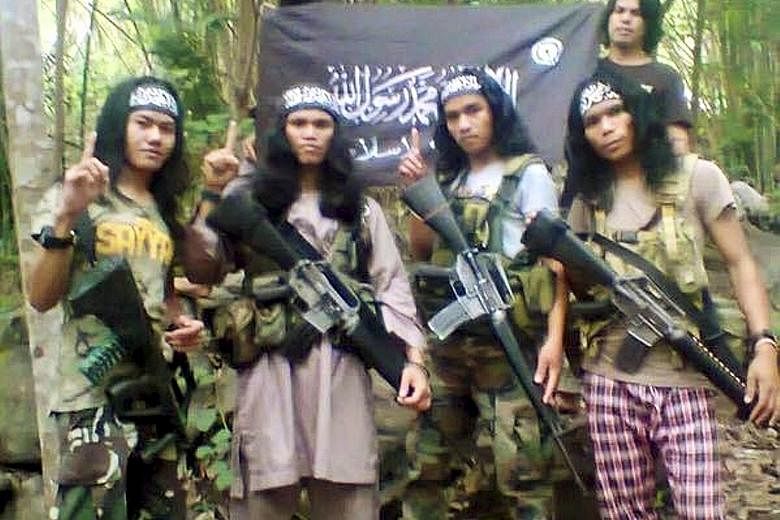MANILA • Philippine President Rodrigo Duterte said yesterday that he will discuss with Indonesia and Malaysia the possibility of creating a task force to combat ISIS-inspired militancy.
His announcement came on the same day that Malaysian police reported the arrest of a suspected leader and seven members of the ISIS-linked Abu Sayyaf militant group in Kuala Lumpur.
Mr Duterte even expressed willingness to open the borders to Indonesian and Malaysian security forces hunting militant fighters. He plans to meet Indonesian President Joko Widodo and Malaysian Prime Minster Najib Razak on the matter.
"We have agreed that we will talk, the three of us. We are just waiting for the right time," he told reporters.
Asked what could be discussed, he said: "In all probability, it will be a joint... task force. And I will open my borders to the Malaysian authorities and Indonesian authorities. They will be given access."
South-east Asian nations have agreed to use spy planes and drones to stem the movement of militants across their borders.
In Malaysia, police said they detained Hajar Abdul Mubin - otherwise known as Abu Asrie - in a raid last Wednesday, according to a police source who was not authorised to speak to the media on the case.
Hajar, a Filipino, was arrested along with one other Filipino and six Malaysians from the Borneo state of Sabah.
The Abu Sayyaf is notorious for bombings, beheadings, extortion and kidnap-for-ransom in the south of the mainly Roman Catholic Philippines.
The arrests were the latest in an ongoing crackdown on militancy by Muslim-majority Malaysia. More than 250 people were arrested between 2013 and last year for suspected militancy linked to the Islamic State in Iraq and Syria (ISIS).
Governments in South-east Asia have been worried over the possible expansion of ISIS in the region as battle-hardened militants return home after the collapse of their self-styled caliphate in the Middle East.
Militants loyal to ISIS seized large parts of Marawi city in the southern Philippines in May. Some 620 militants, 136 soldiers and police officers, and 45 civilians were killed in more than 100 days of fighting.
As Manila steps up the crackdown on militants, family ties are luring Filipino militants and criminals to seek refuge in Malaysia, particularly in Sabah, said intelligence sources.
The sources, who follow the militants issue closely, said these fugitives flee towards Sabah to stay safe from the Philippine authorities and also rival groups bent on revenge against them.
The refugees are said to be related to southern Filipino families of Bajau and Suluk descent that have long settled in Sabah, which shares a porous maritime border with the Philippines.
REUTERS, THE STAR/ASIA NEWS NETWORK

